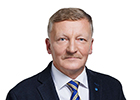The Minister of Public Administration's 2025 presentation on the implementation of the state's long-term development strategy "Estonia 2035"
Session: Fifteenth Riigikogu, fifth session, plenary session
Date: 2025-06-03 13:01
Participating Politicians:
Total Speeches: 106
Membership: 15
Agenda Duration: 2h 21m
AI Summaries: 106/106 Speeches (100.0%)
Analysis: Structured Analysis
Politicians Speaking Time
Politicians
Analysis
Summary
Infrastructure Minister Kuldar Leis presented a report to the Riigikogu on the implementation of the state's long-term development strategy "Estonia 2035" in the infrastructure sector. The Minister emphasized that infrastructure development is directly linked to security, the economy, and the quality of the living environment. The report’s focus was on Rail Baltic, the road network, circular economy, housing economy, aviation, maritime affairs, and water management. Rail Baltic was described as a strategic priority, with construction work already underway over a 100 km stretch, aiming for completion by 2030, bringing significant benefits to the economy and security. At least 70 million euros in additional funding per year was promised in the coalition agreement for road maintenance, focusing on the development of 2+2 road sections (Tallinn–Pärnu, Tallinn–Tartu) and paving gravel roads. In the circular economy sector, the goal is to implement a waste reform to create a new industry from waste and increase the recycling rate to 65% by 2035. In housing economy, support for the comprehensive renovation of apartment buildings will continue from CO2 quota revenues, and the state housing loan guarantee will be increased in market failure areas.
During the question round and negotiations, the profitability and security of Rail Baltic, the realism of construction schedules in Latvia and Lithuania, and Poland's readiness were discussed. There was also debate about the underfunding of roads, the loss of airline routes (Ryanair) due to airport fee increases, plans to consolidate the water reform, and the availability of housing. The Minister confirmed that Rail Baltic is a plus investment for Estonia and that the aggregate impact of the waste reform is positive for the state (plus 20 million euros). Representatives of the factions (Centre Party, Isamaa, Social Democrats, Estonia 200, EKRE, Reform Party) expressed both support for infrastructure development and concern about funding, regional policy, and the availability of housing.
Decisions Made 1
Decisions were not made.
Most Active Speaker
Lauri Laats (from the Centre Party faction) was active both in posing questions and in negotiations, focusing on the viability of Rail Baltic, the underfunding of roads, and problems with air connections. His position is left-of-centre.
Aseesimees Toomas Kivimägi
AI Summary
The agenda includes one important item: the 2025 report by the Minister of Infrastructure on the implementation of Estonia’s 2035 long-term development strategy. The presentation will last up to 30 minutes, after which members of the Riigikogu will have the right to ask the presenter one oral question, and only representatives of the factions will participate in the debate. The Riigikogu will not adopt a decision upon the conclusion of the discussion. And now, it is a great honor to invite the honorable Minister of Infrastructure, Kuldar Leis, to the podium.
Taristuminister Kuldar Leis
AI Summary
Infrastructure Minister Kuldar Leis presented an ambitious plan to develop Estonia's infrastructure through the completion of the Rail Baltic main route, the modernization of roads and railways, the advancement of regional aviation and maritime transport, circular economy reforms, and the renewal of housing and water and waterway systems, all aimed at enhancing security, competitiveness, and the sustainability of the living environment across Estonia.
Aseesimees Toomas Kivimägi
AI Summary
Toomas Kivimägi expressed his thanks, noted that his colleagues had questions, and announced that Aleksandr Tšaplõgin would be the first questioner.

Aleksandr Tšaplõgin
Profiling Fraktsiooni mittekuuluvad Riigikogu liikmedAI Summary
Aleksandr Tšaplõgin posed a four-part question regarding Rail Baltic: how many passengers and goods are needed for the project to be profitable, how to ensure the security of the 1,000-kilometer railway line—which could be taken out of commission by a single missile—how realistic it is for Latvia to complete its section by 2030, and what the situation is in Poland.
Taristuminister Kuldar Leis
AI Summary
Poland is ready to proceed with Rail Baltic and is seeking acceleration, while Estonia, Latvia, and Lithuania plan to have the project finished by 2030. Furthermore, after the entire scope is completed, starting from the second year, state funding will no longer be required, and profitability is anticipated, the precise figures for which will be presented subsequently.
Aseesimees Toomas Kivimägi
AI Summary
The speech text is fragmented and contains only the phrase "Security was...", so I cannot produce an accurate summary; please provide the full speech.
Taristuminister Kuldar Leis
AI Summary
I cannot give a concrete answer on the security issue and will consult with the Minister of Defense, but regarding Rail Baltic, I see no reason to adopt a special solution, and all infrastructure must be protected in the same way.
Aseesimees Toomas Kivimägi
AI Summary
Deputy Speaker Toomas Kivimägi called Lauri Laats to the stage.

Lauri Laats
Profiling Eesti Keskerakonna fraktsioonAI Summary
Lauri Laats is asking the minister for specific steps to boost the competitiveness of Estonian and European aviation. He focuses on opening new routes at Tallinn Airport, maintaining reasonable fees, continuing route subsidies, and developing regional airports. Furthermore, he asks which new airlines have already been approached and how the future of Pärnu and Tartu airports is envisioned.
Taristuminister Kuldar Leis
AI Summary
Tallinn Airport aims to maintain a diverse network of airlines and new routes to avoid dependence on a single carrier and ensure stable service. Simultaneously, the airport is working on developing development plans for regional airports and increasing the utilization of infrastructure to meet the needs of defense and security structures, including planning a greater role for Pärnu Airport.
Aseesimees Toomas Kivimägi
AI Summary
Vice-Chairman Toomas Kivimägi invited Vadim Belobrovtsev to speak.

Vadim Belobrovtsev
Profiling Eesti Keskerakonna fraktsioonAI Summary
Vadim Belobrovtsev asks about Rail Baltic, specifically whether Estonia is ready and capable of finishing the route for Latvia if Latvia cannot do it itself, and what the prime minister's mentioned deficit of 400–500 million euros and the potential funding from European funds mean.
Taristuminister Kuldar Leis
AI Summary
Infrastructure Minister Kuldar Leis said that Estonia’s funding is phased and natural, and will continue over the years. Estonia will help Latvia in two ways: jointly applying for EU funding as Baltic states and sharing its know-how. He added that although the Prime Minister’s statement that "we are building in Latvia" was more symbolic support, Latvia must achieve its goals on its own.
Aseesimees Toomas Kivimägi
AI Summary
Deputy Speaker Toomas Kivimägi asks Urmas Kruuse to come forward and take the floor.

Urmas Kruuse
Profiling Eesti Reformierakonna fraktsioonAI Summary
Urmas Kruuse stated that defense matters do not need to be disclosed to the public. He referred to the forces present in the hall who would seek to obstruct the completion of Rail Baltic. He emphasized lowering prices and speeding up the project by utilizing public procurements, and he asked whether the Finns are looking forward to Rail Baltic being finished and if it could potentially evolve into a Helsinki–Tallinn tunnel, which would significantly strengthen trade relations.
Taristuminister Kuldar Leis
AI Summary
Infrastructure Minister Kuldar Leis said that the tunnel topic has made waves in recent years, but no real steps have been taken. He added that for the project to move forward, Estonia and Finland should be the leading parties. In Estonia, the prerequisite for this is the completion of the Ülemiste terminal Linda, which, being near the airport, could transform Estonian infrastructure into a central hub. However, he does not foresee any progress being made in the coming years.
Aseesimees Toomas Kivimägi
AI Summary
Toomas Kivimägi asked Kersti Sarapuu to come up on stage.

Kersti Sarapuu
Profiling Fraktsiooni mittekuuluvad Riigikogu liikmedAI Summary
Kersti Sarapuu highlighted that the coalition agreement pays great attention to Central Estonia and areas of market failure, and specifically brought up point 340. According to this point, during the second quarter, until June 30, housing availability for young families will be improved by increasing the state guarantee for housing and extending it to areas of market failure. She requested more detailed explanations regarding these measures.
Taristuminister Kuldar Leis
AI Summary
Infrastructure Minister Kuldar Leis announced that new measures related to KredEx/EIS are currently being developed and will be rolled out soon. These are aimed at young families and increasing the state guarantee for housing purchases, primarily outside major cities, and the expectation is that they will be finalized by the end of the second quarter.
Aseesimees Toomas Kivimägi
AI Summary
Vladimir Arhipov is invited to speak.

Vladimir Arhipov
Profiling Fraktsiooni mittekuuluvad Riigikogu liikmedAI Summary
Businesses are complaining about labor shortages, even though there are over 60,000 unemployed people—many of whom are employable. This raises questions about whether Estonia can help its own citizens find work, how this is reflected in the development strategy, and whether there are concrete plans to connect job seekers and employers without resorting to foreign labor.
Taristuminister Kuldar Leis
AI Summary
Kuldar Leis said that unemployment, retraining, and integration into the labor market are repeatedly the focus of government sessions, and these issues should be addressed by the Ministers of Industry and Education, not the Minister of Infrastructure.
Aseesimees Toomas Kivimägi
AI Summary
This text does not contain the content of a speech, but is merely a request directed at Urve Tiidus.

Urve Tiidus
Profiling Eesti Reformierakonna fraktsioonAI Summary
Urve Tiidus emphasized that although Estonia is not classified as a country at risk, and clean drinking water is not a given globally, the availability of quality drinking water and wastewater services requires ongoing investment, particularly in rural and densely populated areas. She then asked how the planned water reform would ensure this without costing an arm and a leg.
Taristuminister Kuldar Leis
AI Summary
The objective of the water reform is to standardize water quality across Estonia, encourage the participation of large water utility operators and support smaller enterprises, and provide additional funding mechanisms to ensure that necessary investments are made and the water system remains safe in the future.

Andre Hanimägi
Profiling Fraktsiooni mittekuuluvad Riigikogu liikmedAI Summary
Andre Hanimägi highlighted that real estate prices in Tallinn are high, primarily due to the cost of land. He advised the state to focus on housing policy and implement a fundamental change: rather than selling state-owned plots at auction, they should use the land to construct residential buildings.
Aseesimees Toomas Kivimägi
AI Summary
Deputy Chairman Toomas Kivimägi invites Andre Hanimägi to speak.
Taristuminister Kuldar Leis
AI Summary
The rules concerning state land could be simplified for the expansion of entrepreneurship, but that is a separate issue; regarding housing, the focus is on areas experiencing market failure so that Estonia is more uniformly covered, though Tallinn and Tartu must not be forgotten.
Aseesimees Toomas Kivimägi
AI Summary
Pipi-Liis Siemann is called to the stage at the beginning of the speech.

Pipi-Liis Siemann
Profiling Fraktsiooni mittekuuluvad Riigikogu liikmedAI Summary
Pipi-Liis Siemann voiced her expectations regarding the outcomes of the coalition agreement and inquired about the housing market, specifically the continuation and expansion of the rental housing program. She also asked whether housing acquisition and the construction of new apartment buildings in areas suffering from market failure could be facilitated via support programs, backed by entrepreneurs and local municipalities.
Taristuminister Kuldar Leis
AI Summary
Infrastructure Minister Kuldar Leis announced that the rental housing program will not proceed. Instead, a new direction has been established in cooperation with the European Investment Bank, local municipalities, and businesses. Under this new framework, housing could be built in areas suffering from market failure, ensuring that Estonia is more uniformly covered and that a decent standard of living is available throughout the entire country. It will become clear this autumn whether this program will be launched.
Aseesimees Toomas Kivimägi
AI Summary
Deputy Chairman Toomas Kivimägi called upon Tõnis Lukas to take the floor.

Tõnis Lukas
Profiling Isamaa fraktsioonAI Summary
He emphasizes that Estonia is small, and infrastructure must be planned systematically to avoid duplication and waste. Furthermore, the efficiency of investments depends on the decisions of neighboring municipalities in the context of urban sprawl, which raises the question of how to carry out developments so that they are not dependent on random decisions.
Taristuminister Kuldar Leis
AI Summary
Infrastructure Minister Kuldar Leis emphasizes that due to the increasing scale of urban sprawl, mobility infrastructure must be systematically planned across wider regions, cycling and light traffic routes must be developed, and close cooperation must be maintained with local municipalities, including their consolidation where necessary, so that overall mobility and infrastructure are better organized.
Aseesimees Toomas Kivimägi
AI Summary
Anti Allast is invited to speak.

Anti Allas
Profiling Fraktsiooni mittekuuluvad Riigikogu liikmedAI Summary
Anti Allas is raising questions regarding the difference between the new grant and the rental housing grant. He is also inquiring about potential changes to the policy governing reconstruction grants for apartment buildings, and what people should consider in light of these changes, especially from the perspective of Southeast Estonia.
Taristuminister Kuldar Leis
AI Summary
The state will focus the renovation of apartment buildings based on actual need and energy consumption. It will disseminate the experience gained in Tõrva, Põlva, and Rakvere throughout Estonia, and tailor the subsidies according to energy consumption and the scope of the project, while reducing the percentage of support provided in larger cities.
Aseesimees Toomas Kivimägi
AI Summary
Deputy Chairman Toomas Kivimägi invited Andrus Seeme to speak.

Andrus Seeme
Profiling Eesti Reformierakonna fraktsioonAI Summary
Andrus Seeme thanked the director and the minister and asked whether 70 million in additional funding would be allocated for road development in the coming period, and whether there was a discussion about increasing the road maintenance support for local authorities (which has been about 29.3 million), or if the local authorities would manage on their own while the state does its part.
Taristuminister Kuldar Leis
AI Summary
Infrastructure Minister Kuldar Leis said that funding for national roads will be increased by approximately 70 million euros, which is in addition to the existing stable amount, and for which European funds will be sought. This roughly 70 million is intended for major highways, paving gravel roads with asphalt, and general repairs, but separate funding for local municipalities has not been discussed at this time, though that does not mean it will not be forthcoming.
Aseesimees Toomas Kivimägi
AI Summary
Jaak Aab is invited to speak.
AI Summary
Jaak Aab said that the measure for the reconstruction of apartment buildings will receive approximately 500 million euros during the 2023–2027 period, which will be allocated from structural funds, CO2 funds, and resources from the Just Transition Fund and the Recovery and Resilience Facility earmarked for Ida-Viru County, and he asked how much the program would be reduced by the transfer of 85 million euros to national defense.
Taristuminister Kuldar Leis
AI Summary
Infrastructure Minister Kuldar Leis stated that approximately 200 million euros will be reallocated. Of this amount, 85 million will go to the Climate Ministry because the funds originated from European sources and remained undistributed. These unused measures can potentially be directed toward the security fund, while the allocated sums for the renovation of apartment buildings will not be reduced; they will either remain unused this year or be carried over to the next fiscal year.
Aseesimees Toomas Kivimägi
AI Summary
Deputy Chairman Toomas Kivimägi congratulates Õnne Pillak and apologizes.
Taristuminister Kuldar Leis
AI Summary
Infrastructure Minister Kuldar Leis stated that he is still clarifying the details and might have to rework specific subsidies so they can be phased out in the future, because a problem arose where the support could not be used.
Aseesimees Toomas Kivimägi
AI Summary
This is merely a request addressed to Õnne Pillak.

Õnne Pillak
Profiling Eesti Reformierakonna fraktsioonAI Summary
Õnne Pillak emphasized the significance of roads in rural areas for both quality of life and entrepreneurship, and requested specific schedules for the expansion of two crucial national highways into four lanes: the Tallinn–Pärnu route and the one heading towards Tartu.
Taristuminister Kuldar Leis
AI Summary
The new road funding decision is so recent that the specific plan detailing the road sections and their completion years will be finalized in the coming weeks. The priority is the Pärnu route due to traffic volume, with the goal of achieving a 2+2 highway by 2030. However, an exception may be made for certain sections if the traffic load is below 10,000 cars per day (for instance, on the Pärnu route heading toward Latvia). For the Tartu direction, the priority extends only up to Tartu, and work will not proceed further south toward Luhamaa. The final distribution years and allocated sums will be determined after the Ministry of Finance calculates the impact of various incentives, and the 70 million in additional funding has not yet been confirmed.
Aseesimees Toomas Kivimägi
AI Summary
Deputy Speaker Toomas Kivimägi asks Riina Solman to come.

Riina Solman
Profiling Fraktsiooni mittekuuluvad Riigikogu liikmedAI Summary
Riina Solman asked when secondary roads in rural areas would become a priority and when they would be guaranteed funding, given that local municipalities have limited resources and it is essential in aging regions that people can get to work, school, and kindergarten.
Taristuminister Kuldar Leis
AI Summary
Infrastructure Minister Kuldar Leis said that the Tallinn–Pärnu and Tallinn–Tartu routes are priorities of the coalition agreement, and the commitment to pave gravel roads with an asphalt surface is included. He added that after the funding figures are confirmed, additional financing will be allocated to major roads, routine maintenance, and the asphalt paving of gravel roads, which is very important for residents and entrepreneurs, even though a definitive solution may not be reached in the immediate years ahead.
Aseesimees Toomas Kivimägi
AI Summary
Ando Kiviberg is invited to perform.

Ando Kiviberg
Profiling Fraktsiooni mittekuuluvad Riigikogu liikmedAI Summary
Ando Kiviberg thanks the Chairman and the Minister, and highlights the interesting news that the Ministry of Climate plans to consolidate local water companies. He then asks what kind of force or leverage is envisioned for implementing this.
Taristuminister Kuldar Leis
AI Summary
Achieving long-term reform in the water sector requires merging the strongest water utilities with the smaller ones and incentivizing them—through fees, pricing, and cooperation—to ensure water quality, even in smaller regions. However, a decision will not be reached today; this is a lengthy process where the interests of the whole of Estonia are paramount.
Aseesimees Toomas Kivimägi
AI Summary
Deputy Speaker Toomas Kivimägi calls upon Jaak Valge.

Jaak Valge
Profiling Fraktsiooni mittekuuluvad Riigikogu liikmedAI Summary
Jaak Valge emphasized that infrastructure policy is part of state governance, and making Estonia better means transforming the state to be agreeable to its citizens. He noted that while the conceptions of the citizens and the minister largely overlap, there are areas where they do not. In the context of Rail Baltic, he questioned whether its construction truly constitutes making Estonia better and whether the majority of society currently desires it.
Taristuminister Kuldar Leis
AI Summary
Infrastructure Minister Kuldar Leis stressed that major decisions must be implemented independently of day-to-day politics, and regarding Rail Baltic, the project must be seen through to the end. He noted that while public opinion in Lithuania is clearly in favor, support in Latvia is less certain, and Estonian expectations require clarification, given that according to the latest surveys, approximately 60% of people support the project.
Aseesimees Toomas Kivimägi
AI Summary
Deputy Speaker Toomas Kivimägi invites Priit Sibul to speak.

Priit Sibul
Profiling Isamaa fraktsioonAI Summary
Priit Sibul emphasizes the goal of increasing the share of waste recycling from 38% to 65%, and asks how much the waste reform has cost taxpayers and society.
Taristuminister Kuldar Leis
AI Summary
Infrastructure Minister Kuldar Leis states that the waste management reform will be more cost-effective for the entire country, as the overall impact is a positive 20 million euros. He emphasizes that this requires the joint contributions of residents, local municipalities, and businesses to boost recycling efforts, citing the example of Latvia's plastic waste plant and its 250 jobs. He further points out that if we fail to establish these industries ourselves, the revenue will be paid to our neighbors. Therefore, it is high time to implement the reform and start acting like proper Europeans.
Aseesimees Toomas Kivimägi
AI Summary
At the beginning of the address, Kalle Grünthal is invited to speak.

Kalle Grünthal
Profiling Fraktsiooni mittekuuluvad Riigikogu liikmedAI Summary
Kalle Grünthal is inquiring about the true owner of Rail Baltic and demanding the specific name and business registry code of the company in order to verify who actually holds the real ownership of Rail Baltic, citing various related entities like AS Baltic Rail, OÜ Rail Baltic Estonia, and the joint ventures of the Baltic states.
Taristuminister Kuldar Leis
AI Summary
The Estonian section of Rail Baltic is the property of the Republic of Estonia, and the state is managing its construction with the assistance of the Minister of Infrastructure and Rail Baltic Estonia.
Aseesimees Toomas Kivimägi
AI Summary
Deputy Chairman Toomas Kivimägi invites Madis Kallas to take the floor.

Madis Kallas
Profiling Fraktsiooni mittekuuluvad Riigikogu liikmedAI Summary
Madis Kallas raised the question of whether Tallinn Airport and the regional airports (Pärnu, Tartu, Kuressaare, Kärdla) should be included under a single expenditure line or treated separately. He also noted that the regional airports generate a significant deficit, which ought to be addressed independently.
Taristuminister Kuldar Leis
AI Summary
A separate development plan is being drafted for regional airports, and the issue of ownership structure is currently under discussion: the more proactive the local municipalities (LGUs) are, the more support the state will provide them in finding solutions. The examples set by Tartu and Pärnu, along with the cooperation with Finnair concerning Tartu air traffic, demonstrate this initiative. However, the future ownership or governance model for Tallinn Airport remains undecided at this time.
Aseesimees Toomas Kivimägi
AI Summary
Vice-Speaker Toomas Kivimägi invites Riina Sikkut to take the floor.

Riina Sikkut
Profiling Sotsiaaldemokraatliku Erakonna fraktsioonAI Summary
Riina Sikkut emphasizes that the infrastructure sector is exceptionally political, because decisions involve transferring maintenance costs to the state budget for decades and affect the lives and movement of thousands of people. She asks when the government will implement evidence-based policy and pursue strategic goals, such as public transport, cycling, and improving traffic safety—for instance, implementing a penalty point system, which the prime minister does not support.
Taristuminister Kuldar Leis
AI Summary
Infrastructure Minister Kuldar Leis said that infrastructure projects follow long-term agreements regardless of who is in power, and the current road safety program is in its final phase, will be completed in June under the direction of the Transport Agency, and will enter into force next year. This includes discussions about measuring average speed and the possibility of camera monitoring, but the focus will be on locations where many accidents have occurred. The final analysis of the program has been completed and will reach the government in the summer or autumn.
Aseesimees Toomas Kivimägi
AI Summary
Vice-Chairman Toomas Kivimägi addresses Anastassia Kovalenko-Kõlvart and asks her.

Anastassia Kovalenko-Kõlvart
Profiling Eesti Keskerakonna fraktsioonAI Summary
Anastassia Kovalenko-Kõlvart's question to the minister focuses on the low-cost Ryanair routes that were lost due to Tallinn Airport's fees and dividend policy, as well as the impact of ending state targeted financing. Simultaneously, she inquires about the progress of the Nordica aircraft sales process and potential options for a summer solution.
Taristuminister Kuldar Leis
AI Summary
Infrastructure Minister Kuldar Leis stated that they are working closely with Tallinn Airport to open new flights and ensure the sustainability of existing routes. He stressed that incentives should be extended to allow new routes sufficient time to settle in, while simultaneously emphasizing the Airport's objective of connecting Tallinn with business travelers and major European hubs. Leis also mentioned that the Finance Minister must comment on the dividend policy, confirmed that state support for the Airport is available, and noted that the Nordica deal is in its final stages, with a decision on whether the transaction will materialize expected by the end of June.
Aseesimees Toomas Kivimägi
AI Summary
Deputy Chairman Toomas Kivimägi invited Reili Rand to speak.

Reili Rand
Profiling Sotsiaaldemokraatliku Erakonna fraktsioonAI Summary
Reili Rand pointed out that the preparatory work for the Rohuküla railway has been completed up to Risti, and once the construction tender concludes, construction could start immediately. She emphasized the economic impact of infrastructure investments and asked what the government’s plan is for the people of Läänemaa and Hiiumaa, and when the Rohuküla train will finally arrive.
Taristuminister Kuldar Leis
AI Summary
The Rohuküla railway is neither in the coalition agreement nor listed as a planned investment. There is no funding, and we cannot give an exact year, but the issue may come up for discussion in the future.
Aseesimees Toomas Kivimägi
AI Summary
Deputy Chairman Toomas Kivimägi called Lauri Läänemets.

Lauri Läänemets
Profiling Sotsiaaldemokraatliku Erakonna fraktsioonAI Summary
The Rohuküla railway is largely complete and the funding is secured, but housing affordability is worsening despite wage growth. Consequently, Lauri Läänemets is asking the government for a concrete plan to regulate rent or build municipal housing, and how this would solve the problems facing both entrepreneurs and ordinary citizens.
Taristuminister Kuldar Leis
AI Summary
Infrastructure Minister Kuldar Leis announced that, in cooperation with the European Investment Bank, local municipalities, and businesses, they will begin constructing apartment buildings or other necessary structures in areas suffering from market failure. These will not be rental properties; rather, the partners will decide the ownership structure and who the buildings will belong to. The program is currently underway, and we expect answers this autumn and winter regarding how and to what extent we will implement it in the coming years. Furthermore, we will not be proceeding with a rental housing program of that nature.
Aseesimees Toomas Kivimägi
AI Summary
Deputy Speaker Toomas Kivimägi invites René Kokk to come forward.
AI Summary
Rene Kokk points out that Estonia can cope even without large influxes of foreign labor, and calls for concrete steps to be taken to allow larger and heavier truck convoys on the roads, so that the logistics, agriculture, and forestry sectors can be more competitive.
Taristuminister Kuldar Leis
AI Summary
The Transport Administration has completed an analysis weighing how long and heavy road trains it would be reasonable to allow onto Estonian roads, and determining which road network is suitable. This assessment takes into account both the capacity of the roads and cooperation with neighbors. Although a general direction on this matter is outlined in the coalition agreement, the final decision regarding tonnage, length, or the specific road network has not yet been made, and clarity is expected by the end of the summer.
Aseesimees Toomas Kivimägi
AI Summary
He opened the debate by asking Lauri Laats to speak on behalf of the EK faction, since one of the registered speakers had vanished in the meantime, and apologized for the unexpected change.

Lauri Laats
Profiling Eesti Keskerakonna fraktsioonAI Summary
Lauri Laats raised the questions surrounding Rail Baltic's maintenance costs and financing, including local governments' concerns regarding the route and the "last mile," and noted that road investments are actually half of what was planned, calling for a thorough discussion, additional clarification, and more time.
Aseesimees Toomas Kivimägi
AI Summary
Deputy Chairman Toomas Kivimägi simply replies in the affirmative: "Yes, please!"

Lauri Laats
Profiling Eesti Keskerakonna fraktsioonAI Summary
Lauri Laats noted that the budget for the traffic safety program is significantly underfunded (26 million planned, but only about 2 million actual), and he stressed that Tallinn Airport needs to have more business flights and cooperation with Ryanair and other airlines in the future, something the minister should actively promote, for example, by visiting the Ryanair office.
Aseesimees Toomas Kivimägi
AI Summary
This is an expression of thanks, and Mart Maastik will speak on behalf of the Isamaa faction.

Mart Maastik
Profiling Fraktsiooni mittekuuluvad Riigikogu liikmedAI Summary
Maastik criticized the plans for segregated waste collection and the renovation of apartment buildings, drawing attention to concerns regarding their substantial costs and CO2 emissions, alongside inadequate ventilation standards. He further noted that road infrastructure funding is insufficient, and the issues surrounding Rail Baltic and the airport demand a clear, sustainable resolution.
Aseesimees Toomas Kivimägi
AI Summary
Toomas Kivimägi notes that there are three minutes left, and the decision is entirely up to you.

Mart Maastik
Profiling Fraktsiooni mittekuuluvad Riigikogu liikmedAI Summary
Maastik stressed that the prosperity of the airport is vital for Estonia, and the state should support our airport and establish an efficient flight connection via a joint airBaltic involving Latvia, Lithuania, and Estonia, rather than counting on profit or demonstrative projects such as waste collection.
Aseesimees Toomas Kivimägi
AI Summary
Toomas Kivimägi thanks you and gives the floor to Andre Hanimägi on behalf of the Social Democratic Party faction and pursuant to authorization.

Andre Hanimägi
Profiling Fraktsiooni mittekuuluvad Riigikogu liikmedAI Summary
The presentation emphasized that Estonian real estate prices have grown rapidly in recent years, while incomes have failed to catch up. Consequently, housing affordability is becoming increasingly difficult, and this particularly threatens the ability of young people and lower-income individuals to start families and have children. This situation demands cooperation between the state and municipalities through the production of affordable apartments, improved detailed planning, and the establishment of a public housing fund, as well as the implementation of tax barriers and other measures at the national level to prevent spatial and social polarization.
Esimees Lauri Hussar
AI Summary
Chairman Lauri Hussar requested two minutes of extra time.

Andre Hanimägi
Profiling Fraktsiooni mittekuuluvad Riigikogu liikmedAI Summary
To prevent young families from moving out of Estonia, we need a clear national housing strategy and leadership that would analyze and decide on the use of land in Tallinn, regulate the proportion of affordable homes in new developments, develop less attractive areas using guarantees and low-interest loans, reduce bureaucracy, and accelerate the processing of detailed planning applications. This is not merely economic or infrastructure policy, but the intersection of demographic, regional, and social policy. If we want young people to see their future in Estonia, the state and the city must intervene to ensure that housing is an accessible fundamental right, not a luxury.
Esimees Lauri Hussar
AI Summary
The Chairman thanks, and on behalf of the Eesti 200 faction, invites colleague Ando Kiviberg to the Riigikogu rostrum and asks about the extension of time.

Ando Kiviberg
Profiling Fraktsiooni mittekuuluvad Riigikogu liikmedAI Summary
The speech emphasizes that we must approach matters economically.
Esimees Lauri Hussar
AI Summary
Chairman Lauri Hussar emphasizes that the speech must be concise and clear.

Ando Kiviberg
Profiling Fraktsiooni mittekuuluvad Riigikogu liikmedAI Summary
Ando Kiviberg thanks the minister for the thorough and optimistic plan and highlights three concerns: Regarding infrastructure, he wants a comprehensive solution that considers the entire European road network, rather than construction done piecemeal; the water supply reform requires thorough consideration, clarification, and the restoration of trust between local communities and the state; and finally, regarding the waste reform, he wants the additional costs associated with the product responsibility system to be addressed, the problems caused by the oligopolistic market to be discussed, and local governments to be granted more rights.
Esimees Lauri Hussar
AI Summary
The Chairman thanks the colleague and announces that the next speaker is Anti Poolamets on behalf of the EKRE faction.

Anti Poolamets
Profiling Eesti Konservatiivse Rahvaerakonna fraktsioonAI Summary
Anti Poolamets asserts that Rail Baltic lacks genuine demand, and its financing is diverting funds away from road construction. He argues that larger locations should be connected first, and the placement of stops should be carefully considered.
Esimees Lauri Hussar
AI Summary
Chairman Lauri Hussar asks for three minutes of extra time.

Anti Poolamets
Profiling Eesti Konservatiivse Rahvaerakonna fraktsioonAI Summary
Anti Poolamets brought up the asphalt shortage resulting from the closure of asphalt plants. He stressed that housing problems for young families could be solved using co-loans provided by the Rural Development Foundation, adding that many families are currently unaware of these opportunities. Furthermore, he criticized the economic impact of the green transition and Rail Baltic, noting that better roads and flexible road transport could connect us to Riga, Vilnius, Warsaw, and Berlin.
Esimees Lauri Hussar
AI Summary
The Chairman thanks [the previous speaker/the assembly] and, on behalf of the Reform Party faction, invites colleague Maido Ruusmann to the Riigikogu rostrum.

Maido Ruusmann
Profiling Fraktsiooni mittekuuluvad Riigikogu liikmedAI Summary
Maido Ruusmann stated that Estonian infrastructure is an essential lifeline, impacting people's lives, the business environment, and the export of services. He added that although funding may never be sufficient, it is necessary to develop roads and rail links (such as Rail Baltica, Tartu–Riga, and Tartu–Helsinki), increase regional cooperation, and consider demographic trends and commuter migration, because the future of connections in Central and Southern Estonia is becoming increasingly crucial.
Esimees Lauri Hussar
AI Summary
Chairman Lauri Hussar requested three minutes of extra time.

Maido Ruusmann
Profiling Fraktsiooni mittekuuluvad Riigikogu liikmedAI Summary
Since no single solution can satisfy all the employment needs of the region, emphasis is placed on the necessity of good connectivity and accessible housing, as well as the importance of road, rail, and external connections, including Rail Baltic, to ensure the region is increasingly better connected, both economically and for security considerations.
Esimees Lauri Hussar
AI Summary
The Chairman thanked the colleagues, announced that there were no further requests to speak, and recalled Section 71 of the Act, which grants members of the Government of the Republic the right to address the body. He offered the Minister the opportunity to take the floor, but the Minister shook his head. Following this, it was declared that the agenda had been exhausted and today's Riigikogu session was adjourned.

